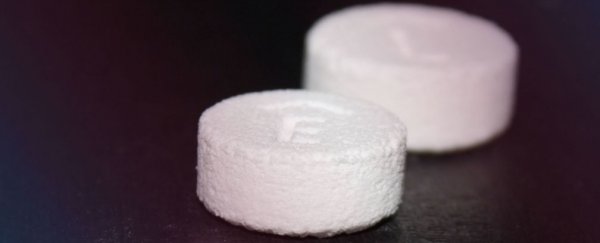We're always hearing about how 3D printing will be capable of delivering major medical advancements in the near future, but this time the big change is right on our doorstep: the US Food and Drug Administration (FDA) has just approved the first 3D-printed drug, potentially heralding a turning point in the way that modern medications are manufactured and taken.
Spritam, made by US-based pharmaceuticals company Aprecia, is an oral formulation of levetiracetam, which is used to control seizures in people who have epilepsy. This new 3D-printed incarnation of the drug is manufactured by a proprietary system developed by Aprecia called 'ZipDose', which stacks layer upon layer of powdered medication with liquid to create a new kind of highly disintegratable tablet.
The technique ensures that the 3D printing isn't just for marketing buzz – although that weren't hurt Aprecia either. The idea is that the tiny tablet and rapid delivery of levetiracetam will make Spritam easier for people to take by encouraging quick, consistent and regular use.
While all ongoing medications should be taken as prescribed – which usually calls for following a regular dosage schedule – the consequences of forgetting to take or otherwise skipping epilepsy medication can be more severe than missing medications for other illnesses. Aprecia cites studies that have shown poor adherence to epilepsy medication can result in experiencing breakthrough seizures. In one case, 71 percent of patients surveyed admitted to having forgotten, missed, or skipped a dose of seizure medication, with almost half reporting a seizure resulting from the lapse.
The ZipDose system is designed to get around these sorts of issues by providing a quicker delivery form: a high dose of medication in a rapidly disintegrating tablet. It does this by depositing liquid droplets of an aqueous fluid on each thin layer of powdered medication. When the 3D-printed tablet comes into contact with a small amount of water, the bonds holding the pill together will rapidly break down, enabling a patient to consume as much as 1,000 mg of a medicated dose with just a single sip of water. It's not a magic bullet ensuring people take their meds, but anything that makes pills easier to swallow can't hurt patients' prospects.
"By combining 3DP technology with a highly-prescribed epilepsy treatment, Spritam is designed to fill a need for patients who struggle with their current medication experience," said Don Wetherhold, Aprecia's CEO, in a statement. "This is the first in a line of central nervous system products Aprecia plans to introduce as part of our commitment to transform the way patients experience taking medication."
